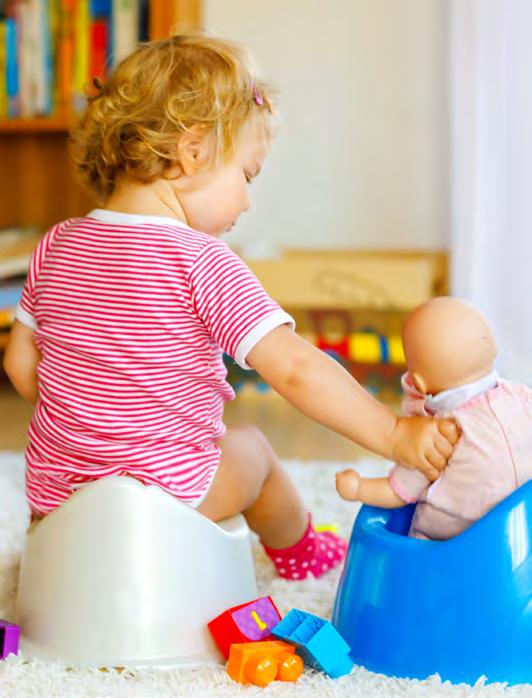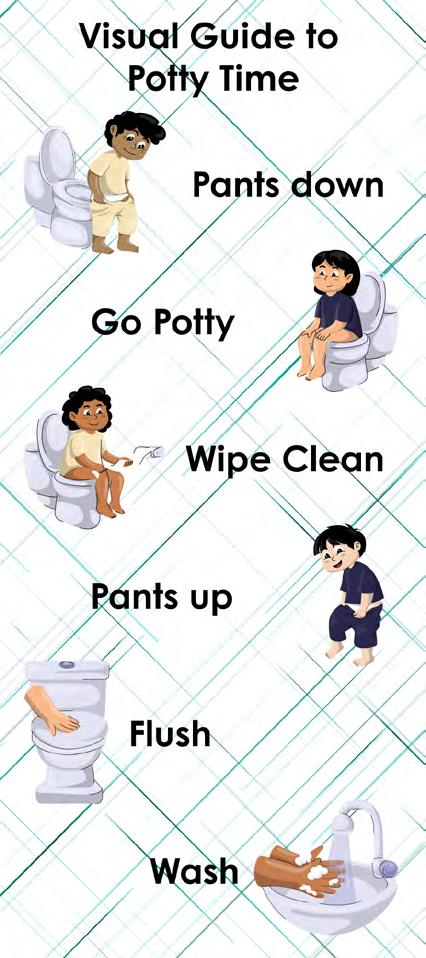

Tips for Potty Time
Potty training is a big step for toddlers and their caregivers. With patience, preparation, and encouragement, it can be a smooth and positive experience. Here are some tips to help families get started with confidence.
1. When Is the Right Time?
There’s no ‘perfect’ age to start potty training. Many children begin between 18 and 24 months, while others might not be ready until age 3 or older, and that’s perfectly okay. Look for signs of readiness:
• Walking to the potty and sitting down
• Pulling pants up and down
• Staying dry for a few hours or after naps
• Showing signs they need to go
• Using words or gestures to show they need to go
If your child shows most of these signs, they may be ready. It’s okay to wait if your family is going through a transition like moving or welcoming a new baby.
2. Get Ready First
Help your child get used to the potty before starting:
• Teach words like ‘pee,’ ‘poop,’ and ‘potty’ (avoid ‘dirty’ or ‘yucky’)
• Let them sit on the potty with clothes on
• Read potty books together
• Pretend with dolls or stuffed animals
• Keep the potty in a familiar spot

Parent Newsletter August 2025

3. Starting the Journey
When it’s time to begin:
• Dress your child in easy-to-remove clothes
• Take them regularly or when they show signs
• Keep potty time short and relaxed
• If nothing happens, try again later
4. Celebrate Every Step
Positive encouragement helps:
• Praise effort, not just success
• Use stickers or small rewards
• Be specific: ‘You told me you had to go—awesome!’
• Stay calm if there’s an accident
5. Teach Clean-Up & Hygiene
As your child uses the potty more often:
• Try training pants or underwear
• Teach wiping from front to back. Wiping takes practice—use fun ways to learn, like dolls or wiping peanut butter off a plate.
• Show how to flush and wash hands
6. Accidents Are Normal
Stay calm and use accidents as learning moments:
• ‘Oops, that’s okay! We’ll try next time.’
• ‘Did you feel it coming?’
• Involve your child in cleanup, stay positive, and keep going.
7. Watch for Challenges
Setbacks are normal:
• Constipation may cause resistance— offer water, fruits, and veggies
• Stress (like a new sibling or daycare) can cause delays
• If problems continue or your child is older than 7, ask your pediatrician
8. Remember: It’s a Process
Potty training takes time. Every child is different.
• Be consistent: potty, wipe, wash
• Praise, don’t pressure
• Stay calm during accidents
• Ask your doctor if you are unsure
With love, patience, and simple routines, your child will succeed. Celebrate small wins— every step counts!




Pollywog Facebook
Pollywog Website
Pollywog Instagram
Pollywog YouTube
Helpful Resources:
• Mayo Clinic: Potty training: How to get the job done
• UC Davis Health: Five do’s and don’ts of potty training your toddler
• HealthyChildren.org: Potty Training
• Brightly: Potty Training 101: Helpful Books for Kids and Their Parents

Pollywog Family 6500 Pacific Blvd. SW, LM-132 Albany, OR 97321
541-917-4884, pollywog@linnbenton.edu
Copyright © Pollywog 2017, All rights reserved.
